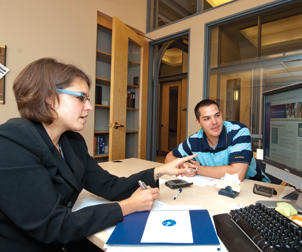Serving Those Who Served, Pitt’s new Office of Veterans Services offers one-stop shopping approach
 Ann Rairigh, (left) director of the Office of Veterans Services, and Pete Lahoda, a Pitt junior and Operation Iraqi Freedom veteran who is a work-study student in the new office.
Ann Rairigh, (left) director of the Office of Veterans Services, and Pete Lahoda, a Pitt junior and Operation Iraqi Freedom veteran who is a work-study student in the new office.Just three years ago in Iraq, U.S. Army specialist Pete Lahoda routinely faced dangerous situations. On some days, he conducted house raids in the intense Iraqi heat; on others, he was jarred when his vehicle hit roadside bombs.
When his 15-month tour of duty ended, the 24-year-old Lahoda headed back to his home neighborhood of Regent Square and eventually re-enrolled at the University of Pittsburgh, where he had been pursuing a degree in engineering. Surrounded by traditional college students in a typical classroom, he felt strangely out of place.
“The other students were all good people,” he said. “But I felt we didn’t have a lot of common interests.”
It’s an experience shared by many returning veterans who decide to pursue higher education. And it’s one of the main reasons there is a new Office of Veterans Services at Pitt—a project that was high on the priority lists of Pitt Chancellor Mark A. Nordenberg and Provost and Senior Vice Chancellor James V. Maher. The new office is located in the McCarl Center within the College of General Studies on the Cathedral of Learning’s fourth floor.
Pitt and other institutions of higher learning are anticipating a rise in enrollment among veterans, reservists, and National Guard members because the new GI Bill is offering $78 billion in educational benefits and living allowances over the next decade.
Pitt’s Office of Veterans Services uses a one-stop shopping approach to help the vets. Preadmission college planning sessions, assistance with paperwork, career counseling, networking, as well as help dealing with stress, lack of sleep, or depression—all of that and more are available under one roof.
“Veterans can feel a little lost in the shuffle sometimes,” said Ann Rairigh, director of the new office. Compounding many veterans’ situations is the fact that they are usually balancing school, a job, and a family.
“We want to make sure we have programs available that address all of those issues,” Rairigh said, adding that some programming will be tailored to the veteran’s spouse or dependents.
Rairigh speaks from experience. Her husband, Matt, 27, is on his third tour in Afghanistan and is scheduled to return next spring. She says when he came home the first time and re-enrolled in college, he was frustrated that there was no one available to help him with getting adjusted to campus life or filling out the stack of benefit forms.
That also was true for Nathan McNeil, 27, who put in five years of active duty in Iraq before enrolling at another local institution of higher education in 2005.
“It was a totally different environment,” said the Marine sergeant and aircraft mechanic, now a chemical engineering major at Pitt. “You had to have your own drive to get things done. No one was there to really help you.”
McNeil said it wasn’t easy going from fending off scud missile attacks to sitting at a classroom desk. He was diagnosed with a slight case of post-traumatic stress disorder (PTSD) and saw a therapist briefly to resolve the problems that kept him up at night.
PTSD is actually quite common among veterans, according to Rairigh. She plans to attend some Veterans Affairs workshops about the condition as she shapes the office’s programming. Each veteran who comes to the Cathedral’s fourth floor is asked to fill out a short survey on what programming he or she thinks would be of value.
Last month, the office hosted two open-house events that provided information on many Pitt schools and departments. And Rairigh has scheduled an orientation session from 11:30 a.m. to 1:30 p.m. Aug. 29 that is specifically for veterans, their spouses, and their children. The new student veterans will learn how to handle their tuition bills, set up e-mail accounts, and navigate key departments at Pitt, including disability and counseling services.
People who have been calling the office have usually been greeted on the phone by Lahoda or McNeil. The two former servicemen put in about 25 hours a week as work-study students, assisting veterans with simple queries and pointing them in the right direction. “I think the most common question is, ‘How do I get started?’” said McNeil, adding that students are calling even before they’ve been accepted by Pitt.
Once they are enrolled, Rairigh hopes they find a “home” at the Office of Veterans Services, where the McCarl Center offers quiet space to study, read, watch TV, or check e-mail. The goal is to develop a cohesive community of veterans on campus. Rairigh says her door is always open—she is easily accessible.
“Anything they need—any question—we can handle,” she said.
Other Stories From This Issue
On the Freedom Road

Follow a group of Pitt students on the Returning to the Roots of Civil Rights bus tour, a nine-day, 2,300-mile journey crisscrossing five states.
Day 1: The Awakening
Day 2: Deep Impressions
Day 3: Music, Montgomery, and More
Day 4: Looking Back, Looking Forward
Day 5: Learning to Remember
Day 6: The Mountaintop
Day 7: Slavery and Beyond
Day 8: Lessons to Bring Home
Day 9: Final Lessons

